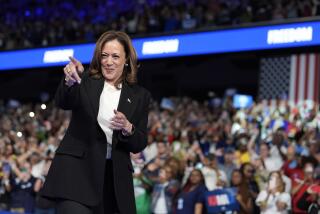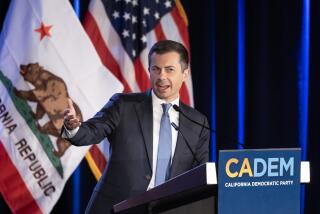What Arnold Schwarzenegger can teach about the presidential campaign
CHARLOTTE, N.C. — In 2005, California voters spanked Gov. Arnold Schwarzenegger, rejecting a series of ballot measures he had promoted to change state government and shake up the public education system.
A year later, he won reelection in a blowout.
No two campaigns are ever alike. Indeed, Schwarzenegger took office under remarkable circumstances — a snap recall election — and may be remembered as much for his shtick (calling balky lawmakers “girlie-men,” for instance) as anything he accomplished in Sacramento.
But Schwarzenegger’s comeback from political disaster seems instructive as Democrats start their national convention here Tuesday and could help explain why the presidential race is so close despite vital signs — the incumbent’s middling approval ratings, the sour mood of the public, widespread economic anxiety — that should put President Obama at a much deeper disadvantage.
There is a reservoir of goodwill that has buoyed the president, both sides agree, in the same way it buoyed California’s celebrity Republican governor after his humbling setback at the ballot box.
“The bright spots were essentially two things: One, people liked Arnold Schwarzenegger. Two, people wanted Arnold Schwarzenegger to succeed,” said Steve Schmidt, who left the George W. Bush White House after the special election and managed Schwarzenegger’s reelection campaign.
Much the same can be said about Obama; polls and focus groups have repeatedly found that voters like him personally and wish him well, even if they disapprove of his performance. That explains the more-sorrow-than-anger tone Mitt Romney, the GOP nominee, adopted in last week’s acceptance speech at the Republican convention.
Republican strategist Karl Rove explained the thinking at a private convention briefing for Republican high rollers that was crashed by a reporter for Bloomberg News. Rove, cofounder of the “super PAC” American Crossroads, which has invested heavily in advertising on Romney’s behalf, noted that direct attacks on Obama excited conservatives but turned off the less-partisan swing voters needed to win the election.
PHOTOS: The protests of the DNC
“If you say he’s a socialist, they’ll go to defend him,” Rove said. “If you call him a ‘far-out left-winger,’ they’ll say, ‘No, no, he’s not.’… If you keep it focused on the facts and adopt a respectful tone, then they’re going to agree with you.”
Privately, Democrats say much the same thing. They are most nervous about advertisements that, in effect, empathize with conflicted voters and assure them that it is OK to vote Obama out of office even if they still like him.
The causes of voters’ grievances with Schwarzenegger and the president are different
For Schwarzenegger, it was the feeling that his ballot measures were more an expensive ego trip, and a thrust at his political foes, than serious attempts at reform.
For Obama, it’s more perilous: a humdrum economy and a sense that, after promising great things in 2008, the results have fallen far short.
But there is an important similarity between the two elections, and that is the overriding sense of disappointment versus anger.
Anger tends to sever a relationship. Disappointment leaves room for forgiveness; it is why Schwarzenegger’s strategists never doubted his ability to come back from his special-election debacle and why Democrats were always dubious about their chances of ousting the wounded governor.
There may be another, even more important reason why voters weren’t ready to give up on Schwarzenegger and, for now at least, don’t seem determined to throw Obama out in November: the historic nature of their victories.
Schwarzenegger was elected in just the second successful gubernatorial recall ever conducted in this country. It was a bottom-up movement that engaged Californians and delivered a strong sense of empowerment; undoing their handiwork so quickly might have suggested it was all for naught.
Obama’s victory was historic in an entirely different way, breaking the ultimate racial barrier in a country blighted by the stain of slavery and racism. Even many who voted against Obama were greatly moved by the moment.
To say Obama has failed would imply that voters had made a mistake four years ago, inevitably taking some gloss off his achievement. That — more than the president’s often-aloof demeanor — may explain why he still claims the support of voters who otherwise say he has not performed as well as they had hoped.
None of this is to suggest Obama will win in November, much less match Schwarzenegger’s landslide performance. The presidential race remains too close to call, and both sides expect a hard slog over the next nine weeks, with a close finish.
Notably, Schwarzenegger apologized for the special election and promised he would do things differently going forward.
“Whether you’re a fan or a detractor of President Obama, the question about what would be different than the last four is a difficult one to answer,” Schmidt said.
Democrats will make their case beginning Tuesday, when the convention program starts in Charlotte.
[For the Record, 8:17 a.m. PST Sept. 4: This post has been updated to feature quotes from Schmidt and deeper analysis.]
Follow Politics Now on Twitter and Facebook
Twitter: @markzbarabak
More to Read
Get the L.A. Times Politics newsletter
Deeply reported insights into legislation, politics and policy from Sacramento, Washington and beyond. In your inbox three times per week.
You may occasionally receive promotional content from the Los Angeles Times.











